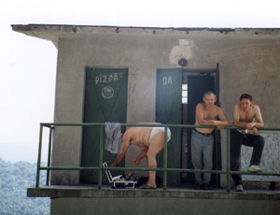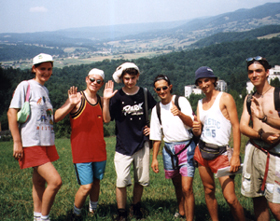

Wednesday, August 5: The Sovata camp is set well out in the country, off an unpaved back road, in a valley surrounded by low forested hills; the landscape suggests the Berkshires in Massachusetts or the Catskills in upstate New York, with all the hype blasted off. There's a cow pasture in the immediate vicinity, and haystacks on the perimeter.
There is one main barracks of whitewashed cement with a steep, shingled roof, containing an office, two rooms filled with bunk beds, and a kitchen in which we all rotate cooking and washing-up duties. There are two MASH-like olive drab tents set up a few paces from the barracks, in which about half a dozen bunk; a primitive set of clotheslines is strung from one of the tents to the other, or to a light pole (at least the place is wired).

Upon our arrival we're introduced to our driver, Mr. Barna, or "Barney," a fiftyish, seemingly easy-going but inscrutable fellow with silver hair and closely cut beard, as well as Jimmy the Dog, a one-year-old Doberman in heat who is kept on a not-quite-short-enough leash; not exactly a cuddly camp mascot.
We eat our breakfast and supper on the small concrete porch out front. Eva, the pleasant, 30ish cook with an accent like her namesake the Gabor sister, is very understanding about making sure I have a cup of boiled coffee in the morning. Eva (who is actually, Orsi informs me much later by e-mail, a biology teacher at one of the best high schools in Mures) has brought along her young son of about six. Off to one side of the porch is, believe it or not, a washing machine, for which we fetch the water from a nearby stream whenever clothes want to be cleaned. That's right, no running water, so we also use this cold, clear stream for washing our hands and bodies, shampooing our hair, shaving, etc., although there are a couple of outhouses nearby for more intimate matters. (The local toilet paper, which is uniform throughout everywhere I traveled in Romania, is, when available, a rough light-brown mass with the consistency and absorbency of crepe paper; I was glad I brought a couple of rolls from civilized Slovenia.)
Placed just back of the tents is a stone longhouse used for storage, along with the most primitive ping-pong table I've ever seen, perched on a floor of rocks and dirt (despite not having played in years, I'm nevertheless one of the better players in camp and have a few energetic contests across the table with Attila and others; ah, at least one thing gained from growing up in suburbia). Add another, half-collapsed longhouse nearby, that we don't bother with, and that's about it. A few minutes' walk down the road, there's a Roma family living in a wrecked old trailer in rural squalor that makes our accommodations look luxurious.

*****
Today we had the most memorable of what I think of as the "stupid teenager cooperation games." Accompanied for some reason by Jimmy the Dog, my group was led a few minutes' walk from camp to a shallow but wide creek in which eight rocks had been strategically placed. We were then told we'd be blindfolded, all but one of us, who would then give directions to the others on how to get across without getting wet. The group was asked to pick the guide. They chose me. I didn't want the responsibility -- what if I screwed up? -- so I nominated Szilárd, who seemed nonplussed but accepted.
So: picture it. Blindfolded, I stood on a rock in the middle of a creek and listened to the others shout directions -- mostly in Hungarian -- on how to get across the eight rocks. This was complicated by the crazed Doberman, who kept racing in and out of the creek, splashing us and worse. "No, Jimmy!" everyone shouted, to no effect.
Somehow, we made it across in a more or less dry state.
A greater challenge awaited us that afternoon, as my group -- Adriana, T.V., Szilárd, Ottó, Zoli, Luci -- set off on a scavenger hunt in the hills surrounding the campsite. I am glad of my hiking boots, a decent, well- fitting pair which I'd purchased in Ljubljana not long before. The object of the hunt was to, by following rather vague directions, collect a number of bottles, each of which contained a word (in English) in which the letters were scrambled. When all the bottles were collected -- on hills, in caves, by power lines, punching our way through bramble bushes -- the words had to be unscrambled to form a phrase. This proved easier in theory than practice, as it necessitated a hike over one steep hill after another, beginning in the hot midday August sun and lasting several hours. Finally, the exhausting enterprise came to an end and we repaired to Lacu Ursu to cool off, where I caused a small scandal among the guys at the picnic table by grabbing a beer from a kiosk (sorry; age has its privileges, especially on hot August afternoons in Romania, most especially after a scavenger hunt in the hills). Oh, yes, and we finally figured out the damn sentence, which had us scratching our heads for quite a while. (Despite being a "native speaker" and a professional writer to boot, I am not particularly good at these kinds of word games, and ended up solving the puzzle simultaneously with a couple of the others. Due to the possibility of future Outward Bound campers reading this, I will omit the sentence we finally unscrambled, but will say that it made us groan. By the way, and it's really liberating to admit this, I stink at any crossword puzzle more complicated than the one in TV Guide, and don't care. Life is too short to worry about whether or not you stink at crossword puzzles. On the other hand, I'm great at Trivial Pursuit, if anyone still plays it anymore.)

That night, at the regular nightly recap led by Attila, who listed the pluses and minuses of the day's events on a blackboard, the most popular phrase seemed to be, "Well, I'd have to say the dog was a big minus..."
"It is just a dog," Attila finally remarked.
But the team spirit seemed to be building.
The campers are fascinated with the newly minted Lonely Planet guide to Romania I've brought with me. I realize that they've probably never seen a tourist guide to Romania printed outside of their country. They gaze at the picture of the young, pompadoured Ceausescu on page 21 and make jokes.
